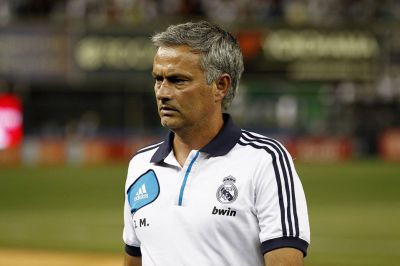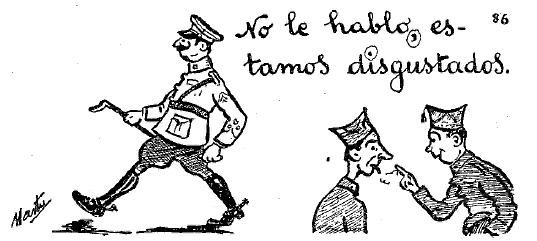
| Языки :: Испанский |
| Аудио |
 |
|
|
239 |
Español |
Spanish |
|
Lección Ochenta y seis (86) |
||
| Un disgusto (1) | A tiff. | |
| 1 | Un día, al volver de la oficina, recibió don Tomás la desagradable noticia de que el almuerzo no estaba aún (2). | One day, on returning from the office, don T. received the disagreeable news [of] that [the] lunch was not yet [ready]. |
| 2 | La culpa de este retraso, según averiguó, no era de su mujer, sino del carbón, que no ardía (3). | The responsibility of this delay, according to what he learnt [inquired], did not rest upon [was not of] his wife but indeed upon [of] the coal, which did not burn. |
| 3 | Muy contrariado agachó la cabeza, hundió ambas manos en los bolsillos del pantalón, pegó una patada en el suelo, (4) | Much displeased, he bent his head, thrust both his hands in the pockets of his trousers, struck his foot on the ground, |
| 4 | dio algunos paseos por la cocina, y luego, con aire preocupado, empezó a rascarse el cogote (5). | took [gave] a few walks in the kitchen and then, with (a) preoccupied look, began to scratch his head [nape]. |
| 5 | Bueno, dijo, no hay mal que por bien no venga : me afeitaré. | Well, he said, it's an ill wind that blows nobody good [there is no harm that for no good comes]; I will shave [me]. |
| 6 | Se retiró a su cuarto, preparó el jabón, suavizó la navaja, y al ir a colgar el espejito de que servía para rasurarse (6), | He retired to his room, prepared the soap, whetted the razor and, on going to hang the small mirror that he used for shaving, |
| 7 | vio que el clavo estaba un palmo más arriba de donde él lo puso (7). | he saw that the nail was 20 centimeters (See note) higher than he had put it [more above of where he put it]. |
| (Sigue.) | (To be continued.) |
| EJERCICIOS | EXERCISE : | |
| En el hotel, | At the hotel. | |
| 1 | La camarera trae sábanas, y hace la cama. | The maid brings sheets and makes the bed. |
| 2 | Haga el favor de ponerme (or: Póngame) una manta más, pues soy muy friolero. | Will you please put (or Put) one blanket more, because I am very chilly. |
| 3 | Tráigame otra toalla, cepílleme este traje. | Bring me another towel; brush me these clothes. |
| 4 | En cuanto llame súbame el desayuno : café con leche y tostadas. | As soon as I call (subj.) bring me up my breakfast : coffee with milk and toasts. |
| 5 | Al armario le falta la llave y tiene la luna sucia. | The wardrobe lacks a key, and the looking-glass is dirty. |
| 6 | El agua del lavabo sale fría. | The water of the wash-basin comes out cold. |
| 7 | Deje correr un rato el grifo y saldrá caliente. | Let the tap open a moment and it will come out hot. |
| 8 | ¿Dónde está el retrete? (or : el W.C., « water »). | Where are the lavatories (singul.). |
| NOTES. | |
| 1 |
Disgusto, a scene, a tiff. He tenido un disgusto con el dueño : I have had a tiff with the landlord. No le hablo, estamos disgustados : I don't speak to him, we are angry (with each other) [have fallen out]. — Eso no me disgusta : this does not displease me (contrary of eso no me gusta). - Disgust, el asco; to disgust, asquear. That disgusts me : eso me asquea (asskay-a) or eso me da asco. |
| 2 |
No estaba aún, was not yet. The word listo, ready, is not necessary for the meaning. We have seen : ¿Está la señora ? Is Mrs. X at home? |
| 3 |
Averiguar (gwarr), to find out, establish. — La culpa es mía, the fault is mine. — Arder, to burn (be consumed). To burn something is : quemar (corruption of cremar; cf. cremation). — Me he quemado el chaleco con un cigarro, I have burnt my waistcoat with a cigarette. — Cuidado ¡que quema! Mind! it's burning. |
| 4 |
Agachar : bajar. — Con la cabeza agachada : with head hanging down. — Yo me agaché para coger mí pañuelo : I stooped down to pick up my handkerchief. — Hundir, to sink; hondo, deep. — I thrust my hands in my pockets: Metí las manos en los bolsillos (Meter is to put or thrust). — No quiero meterme en este lío : I will not put myself into this scrape. — Pegar : 1° to stick; 2° to knock, beat, tap. — Le pegó una patada : he kicked him. |
| 5 | Hence acogotar, to knock senseless, pegar en el cogote. |
| 6 |
Espejito, dimin. of espejo. — Rasurarse is less used than afeitarse. To get reassured, tranquilizarse. |
| 7 |
Un palmo, a span, an ancient measure, from the tip of the
thumb to the tip of the little finger, fingers apart. — Más arriba de or más alto que. |
|
Read the lesson again, putting the verbs in the present : One day, returning from the office, don T. receives, etc... Check under : |
|
|
Sent. 1 : ... recibe ... está. — 2 averigua ... es ... arde. — 3 agacha ... hunde ... pega. — 4 da ... empieza. — 5 dice ... afeito. — 6 se retira ... prepara ... suaviza ... se sirve. — 7 ve ... está ... pone. |
|
|
La manta : the blanket; la mantilla : the mantilla; el mantón : the shawl. La luna : 1) the moon; 2) the looking-glass. — Un armario de luna : a mirror-wardrobe. ¿No le falta nada? : Do you need [lack] nothing? — Me hace falta (or : Necesito) un sacacorchos : I need a corkscrew. — ¿Necesita Vd. algo más? — Nada más. Un traje is rather a man's clothes, a suit of clothes. — A woman's dress is : un vestido. |
